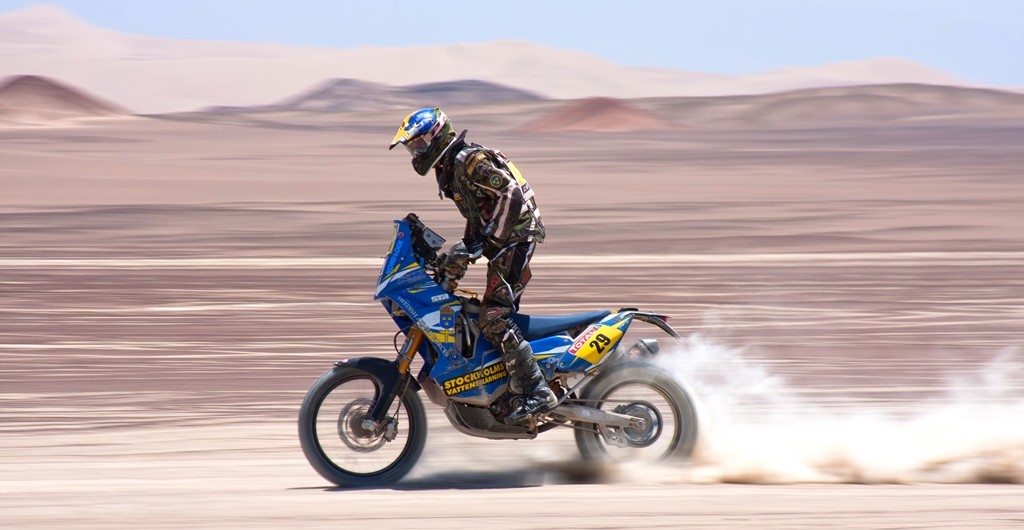The Dakar Rally, also known as The Dakar (and formerly known as the Paris-Dakar Rally), has achieved legendary status, not just in the world of motor sport but across sport as a whole. This embodiment of endurance is covered and broadcast extensively around the world (in 190 countries!), and followed enthusiastically by armies of motor-heads.

The rally was the brainchild of Thierry Sabine. The Frenchman, taking part on a motorbike in the 1977 Abidjan-Nice Rally, found himself hopelessly lost in the sands of the Libyan (Tenere) Desert. He just about managed to return but was left entranced by the beauty of the desert landscape. Sabine then dreamed of a race that would start in Europe and pass through Algiers (Algeria) and Agadez (Niger), before finishing up in Dakar, Senegal. The dream became reality in 1979, and over the years Monsieur Sabine’s vision of adventure has lived up to its promise, and remained true to its motto – “A challenge for those who go. A dream for those who stay behind.”
As befits a race that traverses the desert, The Dakar has been an incident-packed event. The first time the competitors entered the Tenere Desert (in the south-central Sahara), in 1983, they encountered a sandstorm of such ferocity, and one so incessant, that 40 of them lost their bearings, and more than a few disoriented ones drifted off course, losing precious time in getting back on track. Thus was the legend of The Dakar born.

Tragically, in 1986, Sabine and three others were killed when the helicopter they were travelling in crashed into a dune in Mali, during an evening sandstorm. Not surprisingly, the deaths cast a pall on that year’s event (Sabine’s father, Gilbert, subsequently took over the running of the Dakar Rally).
In 1995, The Dakar started in Grenada, Spain, and in 2000 – to mark the beginning of the new millennium – the rally witnessed a suitably millennial finish, next to the Giza Pyramids in Egypt. The year 2007 saw the race flag off in Lisbon, Portugal, but the following year’s edition was cancelled after the killing of four French citizens and three Mauritanian troops, just days before the start, in an act of terrorism.
In 2009, The Dakar turned a new page by journeying to South America, and five years on it continues to hit the dirt roads of Argentina, Bolivia, Chile and Peru, winning new converts every year and always unearthing champion drivers. Success in this event requires an amalgam of skill, courage and navigational nous, and participants must master the never-less-than-tough off-road conditions in an experience that is unique in the world of sport.
The roll of honour
Ari Vatanen of Finland, on four wheels, and France’s Stephane Peterhansel, on two, are among the drivers that have made their names with The Dakar – Vatanen has won four times while the prolific (and versatile) Peterhansel has triumphed on an amazing 11 occasions (including five times in a car!).Vladimir Chagin holds the record for the most wins in the truck category – Chagin has seven titles, including three on the trot (2002-2004), one more than Karel Loprais of the Czech Republic.
Meanwhile, Hubert Auriol made history in the 1992 edition, when the event became the Paris-Cape (Cape Town, South Africa) rally, with participants having to navigate the length of the African continent – a total of 12,427km (approx. 7722 miles)! In a race of 22 stages, passing through 10 countries, France’s Auriol became the first driver to win in both the car and bike categories (he had won on a motorcycle back in 1983).
Special mention must be made of Jean-Louis Schlesser, the only chap to have triumphed in a buggy – the Frenchman repeated his 1999 success a year later. In 2001, Jutta Kleinschmidt became the first (and, till date, only) overall female winner of The Dakar – the German driver is also the first woman to win a rally stage, in 1997 (she also enjoyed a podium finish in 2000). Recent years have witnessed a fascinating duel, in the bike category, between Cyril Despres and Marc Coma, with the former boasting of an impressive five titles and the latter three.

To keep track of the The Dakar 2014, relive the excitement of editions past, and find out more about the event’s history, visit the rally’s official website.
Here is the promo of last year’s rally.




Comments